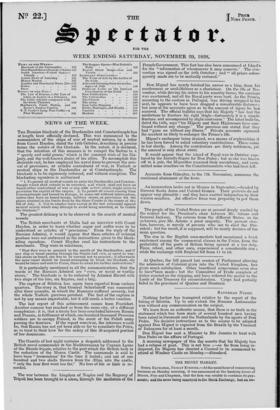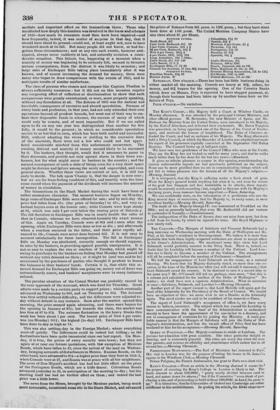THE MONEY MARKET.
STOCK EXCHANGE, FRIDAY EVENING.—At the usual hour of commencing business on Monday morning, it was announced at the banking-house of Messrs. Frys and Chapman, that the firm was unable to continue its pay.
meats; and the news being conieyect to the Stock Exchange, had an WI-
mediate and important effect on the transactions there. Those who recollected how deeply this &mem was involved in the loans and schemes of 1825—how much its resources must then have been impaired—and how frequently, indeed, it was matter of surprise in that day, that it should have stood its ground—could not, at least ought not, now to have wondered much at its fall. But many people did not know, or had for- gotten these circumstances ; and at any rate such events, however anti- cipated, always occur suddenly at last, and naturally occasion a consi- derable sensation. This failure, too, happening at a moment when a scarcity of money was beginning to be seriously felt, seemed to threaten serious consequences, from the distrust it was likely to occasion; and large sales of Exchequer Bills taking place immediately after it was known, and of course increasing the demand for money, there were many who began to draw comparisons with the events of 1825, and to anticipate results of similar misfortune.
The class of persons who reason and compare like Captain Fluellen is always sufficiently numerous : but it did not on this occasion require any surpassing effort of reflection or discrimination to show that such comparisons were greatly overstrained, or were, more properly speaking, without any foundation at all. The distress of 1825 was the natural and inevitable consequence of excessive and absurd speculation. Persons of every trade and profession, in that year, had not only extended their own operations beyond all prudent bounds, but went out of their way to em- bark their disposable funds in schemes, the success of many of which could only be remote, and of most impossible. But if we are called upon to fix on any one year less distinguished than another for this folly, it would be the present ; in which no considerable speculation occurs to us but that in corn, which has been both useful and successful. Still, without adopting the views or yielding to the excessive fears of the alarmists, there were not a few who could not but appre hend considerable mischief from this unfortunate occurrence. The existing distrust and scarcity of money seemed likely to be increased by it. The bankers, they thought, would find it necessary to pause in their discounts, and provide not only against alarm in their town cus- tomers, but for what might occur to bankers in the country ; and the natural consequence of such a state of things even for a very short space might be distress and fa.ilure among the needy and unprovided, and even general alarm. Whether these views are correct or not, it is still too early to decide. The talk upon 'Change is, that the danger is now over; but we are far from feeling confident of this, and heartily wish the time come round when the payment of the dividends will increase the amount of money in circulation.
The transactions in the Stock Market during the week have been of rather anomalous character. The moment business began on Monday, large sums of Exchequer Bills were offered for sale; and by mid-day the price had fallen from 67s. (the price of Saturday) to 473., and very re- luctant buyers even at the lowest rate; while Consols were kept steady at 86, which was only k per cent below the closing price of Saturday. The fall therefore in Exchequer Bills was in nearly double the ratio of that in Consols; whereas we have observed formerly the exact reverse of this. Again on Tuesday, Consols were at 864 and 4 soon after the opening, while Exchequer Bills were done so low as 45s.; and afterwards when a reaction occurred in the latter, and their price rapidly ad- vanced to 60s., Consols were never done beyond 864. It is not easy to account satisfactorily for these incongruities. The fall in Exchequer Bills on Monday was attributed, correctly enough we should suppose, to sales by the bankers, in providing against possible emergencies. It is not so easy to explain the rise or reaction of Tuesday, which might be owing to purchases by the bankers on finding that Monday had passed off without any extra demand on them ; or it might be (and was said to be) occasioned by the purchases of parties who thought it prudent to lessen the balances in their bankers' hands. Certain it is, that while this re- newed demand for Exchequer Bills was going on, money out of doors was extraordinarily scarce, and bankers' acceptances were in many instances refused.
The peculiar situation of the Consol Market was probably caused by the near approach of the Account, which was fixed for Thursday. Great efforts were made by a certain party to support prices ; which eventually advanced on Wednesday to 864, and on Thursday to 864. The Account was then settled without difficulty, and the differences were adjusted to- day without default in any instance. Soon after the market opened this morning, the price seemed again advancing, and there were buyers for the opening in January at 874; but towards the close, the market was less firm at 87 to 874. The extreme fluctuation in the heavy Stocks this week has been about 1 per cent. The lowest price of New 4 per cents. was (on Monday) 1014; the highest (to-day) 103. Exchequer Bills have been done to-day as high as 74.
This was also settling-day in the Foreign Market ; where everything went off quietly. The differences could be indeed but trifling ; as the fluctuations have been quite immaterial since our last report. On Mon- day, it is true, the prices of every security were lower; but they are again at or near our former quotations, with the exception of Mexican Bonds, which have fallen to 32, since the arrival of the mail on Wednes- day, bringing accounts of disturbances in Mexico. Russian Bonds, on the other hand, have advanced to 954—a higher price than they bore in 1824-5, when Consols were at 97, and Russia was at peace with all her neighbours. The news of Don Miguel's accident has had but little effect on the pnce of the Portuguese Bonds, which are a trifle dearer. Colombian Bonds advanced yesterday to 22, in anticipation of the meeting to-day ; but the meeting itself has had no further effect on them ; and indeed the last price was a little lower.
The news from the Mines, brought by the Mexican packet, being much more favourable, occasioned some stir in the Share Market, and, advanced the prices of Bolanosfrum 80/. prem. to 1501. prem.; but they have since been done at 110/. prem. The United Mexican Company Shares have also risen about 3/. per Share.
BRITISH FUNDS. Bank Stock, 201
3 per Cent. Reduced, 854 86 3 per Cent. Consols, 864 Si per Cent. Reduced, 944 New 4 per Cents. 1024 4 per Cents. 1826, 1034 104 Long Annuities, 194 7-16ths.
India Stock, div. 241 240 India Bands, 73 5 2 Exchequer Bills, 71 72 69 Consols for Account, 21 Jan. 864 buyers.
FOREIGN FUNDS.
Brazilian Bonds, 624 63 Buenos Ayres. 47 Colombian, 24 22 Danish, 624 I Mexican 6 per Cents. 32 Peruvian, 17i 184 Portuguese, 544 55 Russian, 95 954 Spanish, 104
SHARES.
Anglo-Mexican, 251.
Bolanos, 400 to 3901.
Brazil, Imperial, MI. to 701.
Ditto, National, 91. 10s. to 101.
General Mining Association, 12/. to 13/4
Del Monte, 150/. to 1601.
United Mexican, 171. to 181.'
SATURDAY, ONE o'cLocK.—There has been but little business doing in either market all the morning. Consols are heavy at 86f, sellers, for money, and 86i buyers for the opening. One of the Country Banks which drew on Messrs. Frys is reported to have stopped payment, al- though their business had been taken up by another house here on the failure of Frys.
FOUR o'cLocx.—No variation.



















